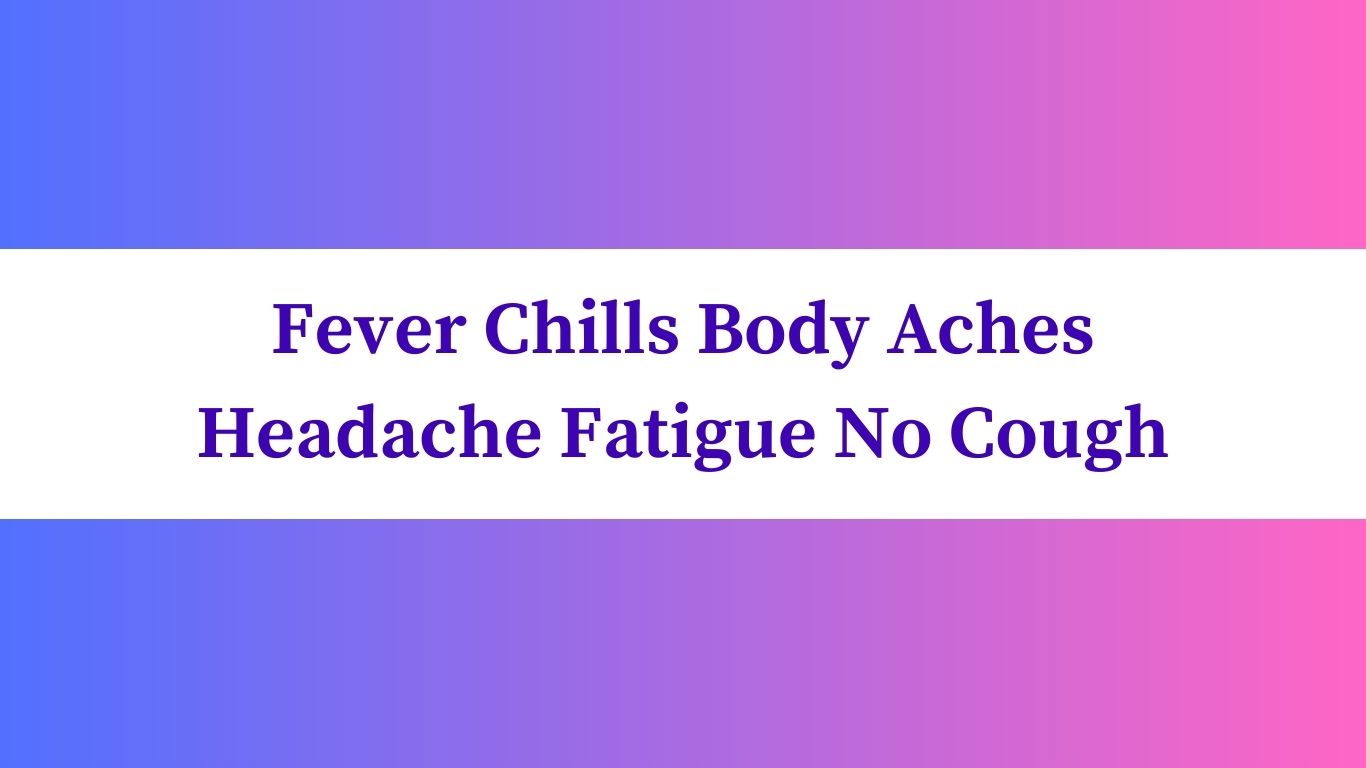You are experiencing flu-like symptoms with fever, chills, body aches, headache, and fatigue, but no cough? This could indicate a viral infection or the flu.
These manifestations often herald a multitude of potential diagnoses, ranging from commonplace viral infections to more insidious systemic illnesses. Each symptom serves as a unique signal, offering clues to the body’s state of distress. Yet, amidst the discomfort lies an opportunity for diagnosis and treatment.
I’ll discuss common causes of these symptoms, potential treatments, and when to seek medical help. I’ll also explore preventive measures to reduce your risk of getting sick.
Viral Symptoms: An Overview
Symptoms such as fever, chills, body aches, headache, and fatigue with no cough can often point to a viral infection. Recognizing these symptoms early on is essential for prompt treatment and recovery. Now, I will delve into the details of these viral symptoms and provide valuable insights into their significance.
Understanding The Key Indicators
Viral symptoms encompass a wide range of manifestations, with fever, chills, body aches, headache, and fatigue being common indicators of a viral infection. These symptoms can often appear suddenly and may vary in intensity from person to person.
Understanding these key indicators can aid in differentiating viral illnesses from other health conditions and can assist individuals in seeking appropriate medical care.
Recognizing Fever As A Primary Symptom
Fever is considered a primary symptom of many viral infections. It is the body’s natural response to an infection and can serve as a vital warning sign. Elevated body temperature, accompanied by chills, body aches, and fatigue, indicates the presence of a viral illness.
Recognizing fever as a primary symptom of a potential viral infection is crucial for taking prompt measures to manage the illness and prevent its spread.
Identifying Chills And Their Significance
Chills, often accompanied by fever, body aches, headache, and fatigue but no cough can signify various health issues. Recognizing the specific symptoms and their implications can aid in seeking appropriate medical attention and care.
Connection Between Body Aches And Virus
Body aches, especially when combined with fever chills, commonly point to the presence of a viral infection. Viral illnesses such as the flu or COVID-19 often manifest with these symptoms. It is vital to be mindful of the body’s signals, as timely intervention and rest can help in combating the virus effectively.
Debilitating Nature Of Headaches
Headaches, especially in conjunction with fever chills and body aches, can be incapacitating. They significantly impact daily activities and can be indicative of severe infections or underlying health conditions.
Identifying the intensity and frequency of headaches is essential in understanding the severity of the illness and determining the appropriate course of action.
Unraveling The Impact Of Fatigue
When experiencing a combination of fever, chills, body aches, headache, and no cough, the impact of fatigue can be particularly pronounced. Fatigue, as a symptom, can have a significant effect on one’s overall well-being and ability to function normally.
Navigating The Absence Of Cough
When fever, chills, body aches, and headache are present without a cough, it can be a perplexing situation. While a cough is often associated with respiratory infections, the absence of it may indicate a different underlying cause.
It’s important to pay close attention to the other accompanying symptoms, including the presence and severity of fatigue, to arrive at an accurate assessment.
Co-relating Symptoms For Accurate Diagnosis
Co-relating symptoms such as fever, chills, body aches, headache, and the absence of a cough can provide crucial insights for healthcare professionals to make an accurate diagnosis. Understanding the interplay of these symptoms, particularly the impact of fatigue, can lead to a more comprehensive approach to managing the condition effectively.
Conclusion
If you’re experiencing fever, chills, body aches, headache, and fatigue without a cough, it’s essential to seek medical advice and get tested for various conditions. Understanding the underlying causes of your symptoms is crucial for proper diagnosis and treatment. Don’t ignore these signs; consult a healthcare professional for appropriate care and guidance.
FAQs On Fever Chills Body Aches Headache Fatigue No Cough
What Are The Common Symptoms Of Fever?
Common symptoms include chills, body aches, headache, and fatigue. These symptoms can often occur together, signaling the presence of a fever.
Is It Common To Experience Fever Without Cough?
Yes, it is common to have a fever without a cough. Fever can occur due to various reasons, such as infections, and may or may not be accompanied by a cough.
How Can I Relieve Fever-related Body Aches?
To relieve fever-related body aches, get plenty of rest, stay hydrated, and take over-the-counter pain relievers as directed. Applying a cool, damp cloth to the forehead can also provide some relief.
Should I Seek Medical Attention If I Have Fever And Chills?
If you have fever and chills along with severe symptoms or if the condition persists, it is advisable to seek medical attention for proper diagnosis and treatment.

Nazmul Gazi is a dedicated final-year student at Cumilla Medical College with a passion for promoting health and wellness. Drawing from his medical studies, Nazmul writes insightful health tips and guides, helping readers make informed decisions about their well-being.

